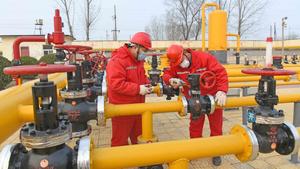 Employees perform maintenance checks on gas pipes at a China Petrochemical Corp facility in Puyang, Henan province, on Jan 29. (TONG JIANG / FOR CHINA DAILY)
Employees perform maintenance checks on gas pipes at a China Petrochemical Corp facility in Puyang, Henan province, on Jan 29. (TONG JIANG / FOR CHINA DAILY)
Central and local government departments in China will help businesses to resume full production after the Lunar New Year holiday that was extended due to the novel coronavirus epidemic, with priority being accorded to those related with necessities in great demand.
Businesses, in particular supermarkets, convenience stores, wholesale and community grocery stores, will get support from the Ministry of Commerce and other related government departments to ensure virus prevention equipment for staff in need, hygiene guarantees at the workplace, and other measures to prevent any workplace contagion, according to a circular issued by the ministry on Thursday.
The move aims to tackle the growing demand for daily necessities, especially in large and medium-sized cities, which are facing difficulties due to the novel coronavirus outbreak, extended holidays and migration to cities, the document said.
The ministry's assurance comes after several regions in the country started to give out specific timelines on resumption of full production to revive the economy.
On Tuesday, East China's Shandong province released a plan to resume full production by the end of this month, making it one of the first in the country. The country's third-largest province by economic output plans to restart operations of all qualified businesses in the region, prioritizing infrastructure services and necessity supplies like hospitals, energy supplies and logistics.
The province has also pledged to resume production for major projects, including those related to new economic momentum, with planned investment totaling over 400 billion yuan (US$57.4 billion).
Other regions like Shanxi province have rolled out detailed regulations and supportive policies, without any specific timelines, for select companies that have restarted or plan to restart operations.
Wang Yixin, vice-governor of Shanxi, encouraged State-owned companies to first restart operations via flexible remote work arrangements on Tuesday.
Provinces like Hebei are also reported to have stepped up efforts to support companies and projects to restart operations.
Liu Chunsheng, an associate professor of international trade with the Central University of Finance and Economics, said the moves are necessary to guarantee daily lives and economic development. Liu said it is essential for the government to strike a balance between novel coronavirus outbreak control and economic development.
Liu said further measures are expected to prevent the epidemic from spreading, such as encouraging people to privately commute and avoid rush hours.
"Shandong's decision to restart full production is a positive signal that the economy is starting to get back to the normal track," said Yang Weiyong, an associate professor of economics with the University of International Business and Economics in Beijing.
Yang said that more regions, except for the hard-hit areas, are expected to resume full production soon with measures to prevent workers from getting infected.
Joe Zidle, managing director and chief investment strategist at Blackstone Group, told Bloomberg that policymakers in China are taking proactive measures to mitigate some of the worst economic impacts, including reopening the market. But Zidle noted companies are going to struggle in the short term.
Several local governments have rolled out supportive measures such as utility subsidies and rent cuts.
Contact the writers at liuyukun@chinadaily.com.cn



